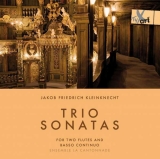Allegrezza, der Schlusssatz aus der Triosonate für zwei Flöten und Basso continuo ist bezeichnend für diese Aufnahme mit Musik von Jakob Friedrich Kleinknecht. Freude, Leichtigkeit – so lässt sich die Satzbezeichnung übersetzen, und genau so kommen die Interpretationen von La Cantonnade auch beim Zuhörer an.
Jakob Friedrich Kleinknecht, Spross einer Musikerdynastie, war selbst Flötist und hat vorwiegend Kammermusik komponiert. In seiner Biographie klaffen noch beachtliche Lücken, sie ist dennoch charakteristisch für viele Musiker im ausgehenden 18. Jahrhundert. Zunächst im Dienst des Erzbischofs von Eichstätt konvertierte Kleinknecht zum Katholizismus. Später als Musiker in Bayreuth gab es die Rolle rückwärts zum Protestantismus: Cuius regio, eius religio – wessen Land, dessen Religion.
Kleinknechts Musik war zu seinen Lebzeiten beliebt und international bekannt, wie Veröffentlichungen in ganz Europa belegen.
Das Ensemble La Cantonnade gibt uns nun die Gelegenheit, Kleinknechts Musik neu kennen und schätzen zu lernen. Das Ensemble spielt die fünf Triosonaten mit blühender Fantasie, großem Engagement und frischem Esprit. Wir sind klar in einer Übergangszeit vom Barock zur Klassik – Musik mit viel Drive, einer belebenden Rhetorik aber auch schon mit klassischem Sinn für Eleganz und perfekte Form.
Das erleben wir alles in den munteren Dialogen der einzelnen Instrumente, im animierten Wortwechsel zwischen Soli und Continuo.
Allegrezza, the final movement from the Trio Sonata for two flutes and basso continuo is characteristic for this recording with music by Jakob Friedrich Kleinknecht. Joy, lightness – this is how the name of the movement can be translated, and this is exactly how the interpretations of La Cantonnade come across to the listener.
Jakob Friedrich Kleinknecht, scion of a musical dynasty, was himself a flutist and composed mainly chamber music. There are still considerable gaps in his biography, but it is nevertheless characteristic of many musicians in the late 18th century. Initially in the service of the Archbishop of Eichstätt, Kleinknecht converted to Catholicism. Later, as a musician in Bayreuth, there was the rollback to Protestantism: Cuius regio, eius religio – whose country, whose religion.
Kleinknecht’s music was popular and internationally known during his lifetime, as evidenced by publications throughout Europe.
The ensemble La Cantonnade now gives us the opportunity to get to know and appreciate Kleinknecht’s music anew. The ensemble plays the five trio sonatas with flourishing imagination, great commitment, and fresh spirit. We are clearly in a transitional period from the Baroque to the Classical – music with plenty of drive, an invigorating rhetoric but also already with a classical sense of elegance and perfect form.
We experience all this in the lively dialogues of the individual instruments, in the animated exchange of words between solos and continuo.
























